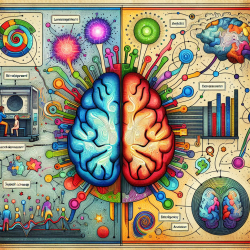Introduction
The intersection of autism spectrum disorder (ASD) and anxiety is a complex area of study that demands attention due to its significant implications on the functional outcomes of affected youth. The study titled "Disentangling the autism-anxiety overlap: fMRI of reward processing in a community-based longitudinal study" provides valuable insights into the neural mechanisms underlying this comorbidity.
Understanding the Research
This research involved a large sample of adolescents, utilizing functional magnetic resonance imaging (fMRI) to explore how ASD traits and anxiety interact during reward processing. The study revealed distinct neural patterns that could potentially serve as biomarkers for anxiety in individuals with ASD traits.
Key Findings
- Youth with high ASD traits exhibited reduced brain activation in prefrontal regions during reward anticipation and negative feedback.
- Those with anxiety symptoms showed increased activation in the lateral prefrontal cortex during anticipation but decreased activation following feedback.
- Combined ASD traits and anxiety were associated with unique neural patterns, including heightened right insula activation during reward anticipation.
- Increased activation in specific brain regions during reward anticipation predicted the onset of anxiety in youth with high ASD traits over a two-year period.
Implications for Practitioners
For practitioners, these findings underscore the importance of considering the unique neural and psychological profiles of children with co-occurring ASD and anxiety. Understanding these neural correlates can guide more tailored interventions, potentially improving outcomes for these children.
Encouraging Further Research
The study highlights the need for continued research into the distinct mechanisms driving the ASD-anxiety overlap. Practitioners are encouraged to stay informed about emerging research and consider participating in studies that explore these complex interactions further.
Conclusion
By integrating findings from this study into clinical practice, practitioners can enhance their understanding and management of comorbid ASD and anxiety. This approach promises to improve the quality of life for affected children and their families.
To read the original research paper, please follow this link: Disentangling the autism-anxiety overlap: fMRI of reward processing in a community-based longitudinal study.










